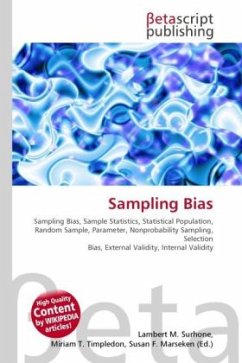High Quality Content by WIKIPEDIA articles! In mathematics, statistics, and the mathematical sciences, a parameter (G: auxiliary measure) is a quantity that serves to relate functions and variables using a common variable (often t) when such a relationship would be difficult to explicate with an equation. In different contexts the term may have special uses.Strictly speaking, parameters are denoted by the symbols that are part of the function's definition, while arguments are the values that are supplied to the function when it is used. Thus, a parameter might be something like "the ratio of the cylinder's radius to its height", while the argument would be something like "2" or "0.1". In some informal situations people regard it as a matter of convention (and therefore a historical accident) whether some or all the arguments of a function are called parameters.
Bitte wählen Sie Ihr Anliegen aus.
Rechnungen
Retourenschein anfordern
Bestellstatus
Storno








